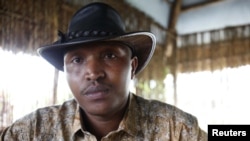Congolese general-turned-rebel leader Bosco Ntaganda surprised many by turning himself into the U.S. Embassy in Rwanda on Monday with the request to be sent to the International Criminal Court where he is wanted for alleged war crimes.
Ntaganda, dubbed "The Terminator," has been indicted by the ICC on seven counts of war crimes and three counts of crimes against humanity.
The ICC says that as leader of a militia in the eastern Democratic Republic of Congo, he was criminally responsible for the use of child soldiers and acts of murder, rape and sexual slavery.
However, during his militant career Ntaganda blurred the lines, working with both government and rebel forces in both Rwanda and the DRC.
Ntaganda was born in Rwanda in 1973, but fled to eastern Congo as a child following attacks on his fellow Tutsis. As a teen he joined the Rwandan Patriotic Front and during the 1994 genocide fought under the command of Paul Kagame, the current president of Rwanda.
Ntaganda went on to command the the military wing of the Union of Congolese Patriots, led by Thomas Lubanga. At this time, he allegedly led efforts to recruit and enlist child soldiers to fight in the Ituri region of the eastern DRC.
The ICC alleges that while under his command in 2002 and 2003, the UPC would encircle towns and villages of the Lendu and other tribes, shell them and then ethnically cleanse the areas by killing and raping civilians, forcing them to flee and looting their property.
Ntaganda was briefly held in custody in 2002 in Kinshasa, but was released in exchange for a government minister, Ntumba Luaba, who was being held by an Ituri militia leader.
Ntaganda went on to lead another rebel group known as CNDP (National Congress for the Defense of the People), but later became a general in the Congolese army in 2009 as part of a peace deal integrating his group into the military.
Members of his militia group, the CNDP, were also integrated into the army in 2009, but Ntaganda and many of the soldiers deserted in 2012 and formed the rebel group M23.
The international watchdog Human Rights Watch accuses M23 of numerous war crimes including killings, rape and recruitment of child soldiers.
A U.N. spokesperson quotes the secretary-general’s special representative for the DRC, Roger Meece, as saying that Ntaganda's surrender and early transfer to the ICC would help advance Congo's peace process.
"He said it would also send a strong signal to human rights defenders anywhere that they are not beyond justice," said Meece.
Ntaganda, dubbed "The Terminator," has been indicted by the ICC on seven counts of war crimes and three counts of crimes against humanity.
The ICC says that as leader of a militia in the eastern Democratic Republic of Congo, he was criminally responsible for the use of child soldiers and acts of murder, rape and sexual slavery.
However, during his militant career Ntaganda blurred the lines, working with both government and rebel forces in both Rwanda and the DRC.
Ntaganda was born in Rwanda in 1973, but fled to eastern Congo as a child following attacks on his fellow Tutsis. As a teen he joined the Rwandan Patriotic Front and during the 1994 genocide fought under the command of Paul Kagame, the current president of Rwanda.
Ntaganda went on to command the the military wing of the Union of Congolese Patriots, led by Thomas Lubanga. At this time, he allegedly led efforts to recruit and enlist child soldiers to fight in the Ituri region of the eastern DRC.
The ICC alleges that while under his command in 2002 and 2003, the UPC would encircle towns and villages of the Lendu and other tribes, shell them and then ethnically cleanse the areas by killing and raping civilians, forcing them to flee and looting their property.
Ntaganda was briefly held in custody in 2002 in Kinshasa, but was released in exchange for a government minister, Ntumba Luaba, who was being held by an Ituri militia leader.
Ntaganda went on to lead another rebel group known as CNDP (National Congress for the Defense of the People), but later became a general in the Congolese army in 2009 as part of a peace deal integrating his group into the military.
Members of his militia group, the CNDP, were also integrated into the army in 2009, but Ntaganda and many of the soldiers deserted in 2012 and formed the rebel group M23.
The international watchdog Human Rights Watch accuses M23 of numerous war crimes including killings, rape and recruitment of child soldiers.
A U.N. spokesperson quotes the secretary-general’s special representative for the DRC, Roger Meece, as saying that Ntaganda's surrender and early transfer to the ICC would help advance Congo's peace process.
"He said it would also send a strong signal to human rights defenders anywhere that they are not beyond justice," said Meece.





